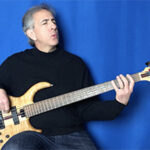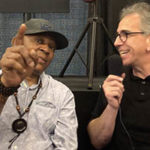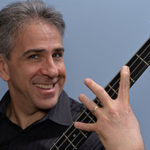How tuned in are you to everything that’s going on?
By Jon Liebman
May 20, 2022
When learning bass, one of the things we’re told repeatedly is how important it is to listen.
Makes sense, right?
But what, exactly, are we listening for? And how should we respond to what we hear?
The obvious answer is that it’s about interpreting the combination of what we’re playing and what everyone around us is playing, and responding accordingly. There’s a balance that needs to be struck, for sure.
But there’s more to it than that, and if you want to be a good bass player, you really need to get this.
I had a school bandleader once who told us that if we can hear ourselves playing, then we’re too loud. I think that’s a bit extreme, but I knew what he was getting at. An ensemble is the blending of different sounds. The more sounds there are, the harder it is to find the right blend with everyone, so we all need to contribute just the right amount.
Every instrument in the band plays a certain role. And sometimes those roles get tossed from one instrument to another. Having the sensitivity, the intuition, to know when to play, what to play, how to play, etc., in response to everything that’s going on, is a must for every member of the band, including, of course, the bass player.
Dive into it
I had a very enjoyable conversation recently with Eminence Ensemble bassist Zac Flynn, published as this week’s FBPO interview. Zac said some insightful things about listening that were dead-on. He hit the topic right on the head. His remarks can be especially helpful to anyone learning bass.
First, he emphasized how important good listening skills are, regardless of what style of music you’re playing. For example, “If you’re into the classic rock songs,” he says, “really dive into it. Learn about who the bass player was, learn about what kind of bass they used, how they got their tone.”
And when he says dive in, he really means it. “Don’t be afraid to spend a week on just a song,” he says, “on just really locking in with how they wrote their part. And just do it every day. Ten minutes a day is going to go a lot further than 50 minutes once a week.”
Listen with intention
Beyond that, Zac says, it’s important to understand how the bass needs to fit in with everything else.
“I think a lot of it is just listening with intention,” he says. And boy, did that strike a chord with me. It’s all but impossible for me to hear a piece of music without analyzing it, scrutinizing the instrumentation, the articulations, dynamics, arrangement…
“A lot of people listen to music for the ambience or the vibe,” Zac says. But if you want to be good at playing bass in a band, he says, you need to be “really taking time to listen, you know, where is the drummer really putting the pocket, where is the harmony, what’s really happening. Listening with that intention and with that specific ear.”
You never know what might happen
Consider how intense listening can make a huge difference in these often unexpected real-world situations:
· Is the singer taking some liberties with the tempos? It happens all the time, so be sure to watch, listen, and follow (or you’re sure to get some dirty looks).
· Is the sax player extending his solo as he sees how the crowd is getting into it? Be sure you’re tuned in and on board. You need to look and sound like you know what’s going on, even (especially) if it diverts from the original game plan.
· Did the keyboard player (who’s possibly also the bandleader) impulsively start playing a cool new riff in the middle of a tune? You need to hear that and respond accordingly. Eye contact, nods, and smiles can transform things like that into some truly great moments. The crowd will dig it too!
A word of caution
Everyone in the band needs to be tuned in to what everyone else is doing, so be sure to keep that in mind when learning bass and when practicing. It’s all too easy to fall into the trap of trying to build technique for technique’s sake, mistakenly thinking that that’s what’s going to make you a good bass player.
While building technique is certainly important – we spend a lot of time on it in the Bottom Line Club – it’s even more important to keep in mind that it’s a means to an end. The goal is not to dazzle the people with your chops; the goal is to make music, and listening is a vitally important component of that.
“I could talk all day about technique,” Zac says, “but at the end of the day, it’s the ear that really matters.”
What about you? What musical situations have you been in that required special use of your listening skills? Leave a comment below and share it. In the meantime, watch my interview with Zac here.




